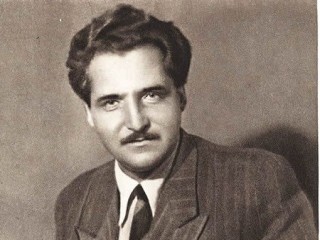
Konstantin Mikhailovich Simonov biography
Date of birth : 1915-11-28
Date of death : 1979-08-28
Birthplace : St. Petersburg,Russia
Nationality : Russian
Category : Famous Figures
Last modified : 2011-10-11
Credited as : Poet, Red Army, patriotic verse
The Russian poet and novelist Konstantin Mikhailovich Simonov (1915-1979) is best known for his patriotic verse dealing with World War II and for his vivid prose descriptions of Soviet troops in action during the war.
Konstantin Simonov was born on Nov. 28, 1915, in St. Petersburg. His father took an active part in the revolution and served throughout the civil war as a commander in the Red Army. Simonov traveled with his father's division and received his secondary education at various provincial schools, chiefly in Ryazan and Saratov. He finished school in 1930. Between 1930 and 1934 Simonov attended university part-time while working as a lathe operator in Saratov and Moscow. In 1934 he entered the Gorky Institute of Literature, studying there until 1939. He received his degree in literature and completed a year of graduate study at the institute.
Simonov's first verses were published in 1934. He continued to write poetry throughout the 1930s, and his first book, Verses, 1939, was published in 1940. Much of its contents was inspired by a trip that Simonov made to Mongolia in 1939 as a war correspondent. In 1939 Simonov became a member of the Communist party, and in June 1941 he was called to military duty as a correspondent for the journal Red Star. His wartime dispatches were read by a wide audience, and he was awarded several medals for his work, including the Stalin Prize. After World War II Simonov traveled extensively as a member of various literary and journalistic delegations, visiting Japan, China, the United States, and Western Europe. A member of the editorial boards of various Soviet journals and publishing houses, Simonov twice served as a deputy to the Supreme Soviet of the U.S.S.R.
Simonov's literary output was large and varied. He is primarily known for his poetry about the suffering that war causes both to men at war and to their families. Although not innovative, his poetry communicates a personal compassion for its subjects. Its style often draws on colloquial speech and conversational rhythms. Simonov's prose is also noteworthy. His most widely read novel is Days and Nights (1944), which deals with the courage of Soviet forces during the siege of Stalingrad. Simonov does not limit himself to the depiction of heroic acts alone but also portrays the deep emotions of men under stress. His prose exhibits an economy of style and a sense of dramatic action unusual in war novels of the cold-war era, which generally glorified the Soviet government and were expected to function as propaganda
for the Soviet system. Simonov's postwar novels deal largely with the conflict between the Soviet Union and the United States. In Smoke of the Fatherland (1947), he blames the United States for the cold war but asserts the need for common understanding.
Simonov was a proponent of conventional values in officially acceptable Soviet literature, the only literary expression possible for a writer after modernism and the expression of individual vision or creativity were suppressed in the 1920s and 1930s. In the less repressive Khrushchev era after 1953, he was able to create more independent characters who revealed more of the true circumstances of Soviet life. While he was editor of the distinguished journal Novy Mir (1954-57), he published an essay criticizing Soviet Realism, the doctrine that all literature must further the goals of the Soviet political system and present only a positive view of Soviet life. In 1957 he was removed as editor for publishing controversial works.
In 1968 he and other high-ranking members of the Union of Soviet Writers refused to sign a statement of official support for the government's invasion of Czechoslovakia; yet he remained an esteemed member of the Soviet literary establishment. Throughout the 1970s he served as secretary of the Union of Writers. He died in Moscow in 1979.
Discussions of his writing are in Biographical Dictionary of the Former Soviet Union, Bowker-Saur, 1992; Encyclopedia of World Literature in the 20th Century, Continuum Publishing, 1993; Gleb Struve, Soviet Russian Literature, 1917-1950 (1951); and Vera Alexandrova, History of Soviet Literature (1963). □
















